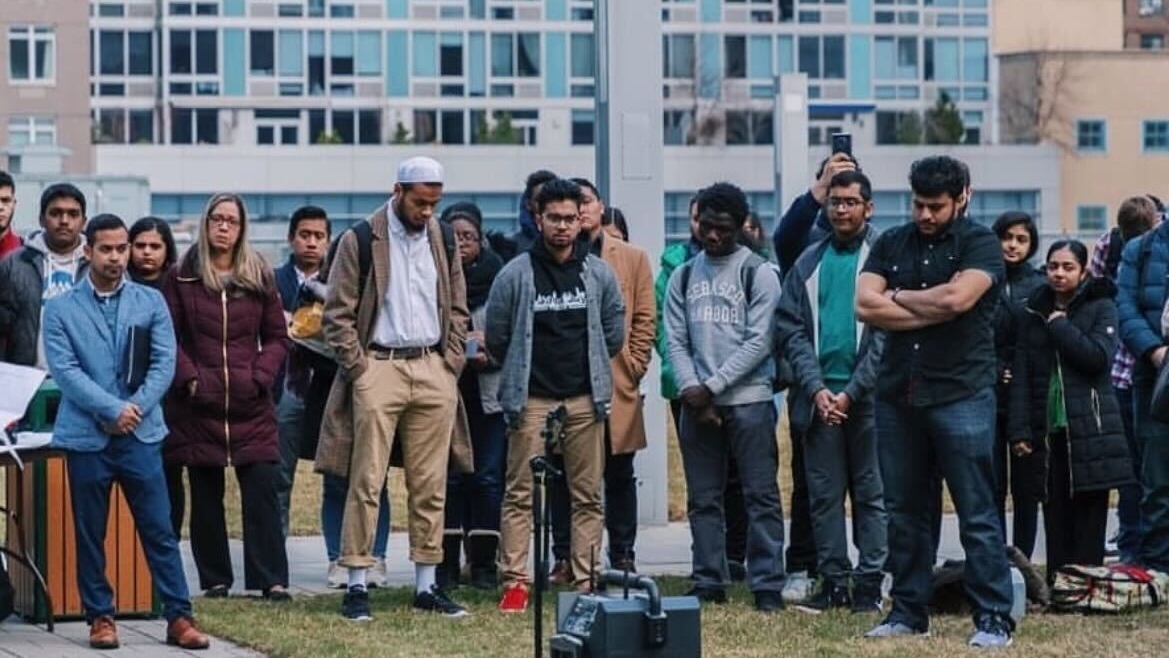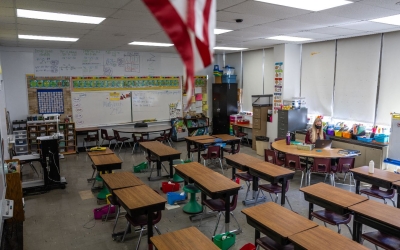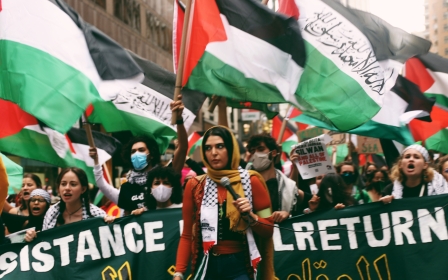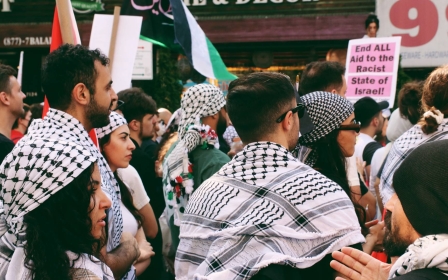US: The battle for Eid holidays in the country's largest urban university system

Nadia Khan never got a day off for Eid during primary school in New York City. Her family would keep her home on the two Muslim holidays and send a note to her teachers the following day, letting them know about her absence. In high school, though, the notes wouldn’t work.

She had to sacrifice family gatherings and prayers at the mosque for exams she could not make up.
New MEE newsletter: Jerusalem Dispatch
Sign up to get the latest insights and analysis on Israel-Palestine, alongside Turkey Unpacked and other MEE newsletters
In 2015, one year after she graduated high school, New York City public schools added Eid al-Fitr and Eid al-Adha as public holidays on the school calendar. From that point onwards, school would no longer be in session.
“All we wanted was to spend the days with our families. Every Eid morning, my mom would give us kheer (rice pudding) and we would get dressed and go to the masjid (mosque) to pray Eid salah,” Khan said. “Then we’d spend the whole day with our family, eating and celebrating. It happens just two days a year. Every student should easily have that."
Her siblings and the tens of thousands of Muslim students attending New York City public schools would no longer have to endure what Khan and others did. But that luxury doesn’t extend to all colleges.
And now, years later, Muslim students are continuing the fight to have two days off on the City University of New York (CUNY) calendar.
CUNY is New York City’s public university system and is comprised of 25 campuses. It promotes itself as being the largest urban university system in the US. Which, students say, begs the question: What is taking CUNY so long to recognise Eid Muslim holidays and have them as days off?
In 2020, a student started a petition calling on CUNY to cancel classes on Eid the following year. “As an institution that prides itself on diversity and inclusion, conducting classes during Eid al-Fitr forces Muslim students to make the difficult decision of choosing between observing this sacred holiday or attending lectures, labs, and classes,” the online petition said.
“Should Muslim students make the decision to observe the holiday, they risk missing out on valuable class time which can hurt their academics, even if there is no de facto academic penalty for excusing themselves on the basis of religious accommodations.”
'They don't really consider the Muslim community's needs. It’s very simple, very straightforward'
- Mohamed Zin, CUNY student
The petition received over 15,000 signatures, but it went nowhere.
In 2021, Mosaab Sadeia and a few of his classmates also started to push for a CUNY-wide holiday for Eid. This time though, it was in person. They rallied people, met with CUNY leadership and protested outside campuses. But like the petition, their push was met with silence. And since then, Sadeia has long graduated.
In January, the San Francisco Unified School District - universities are not within their jurisdiction - issued a number of recommendations for adding new holidays to the public school calendar, including recognising certain religious holidays without formally labelling them as holidays or closing school for those days.
But just weeks later, the San Francisco school district backtracked on a decision to make Eid a school holiday.
“Why is it that Muslims have to accept not having their holidays acknowledged? Everyone should have their holidays respected and accommodated,” Sadeia said. “It isn't crazy for Muslims to ask for their days off. CUNY seems like it's just not willing to make the sacrifice or to make the effort.”
Accommodations, not holidays
According to Sadeia, whenever he and his classmates reached out to leadership asking for the days off, they’d get referred to CUNY’s "accommodation" policy.
The policy allows professors to make accommodations for their students, if they were to take the day off for a religious holiday, for example. It is an excused absence. According to the policy, if there were an exam scheduled on the day of Eid, the student would be able to retake it on a different day.
“The City University of New York acknowledges the significance of Eid al-Fitr and Eid al-Adha in the lives of our Muslim students who celebrate these important holidays," a CUNY spokesperson told Middle East Eye.
"As campuses routinely remind faculty and students, it is New York State law - and CUNY policy - that all students are entitled to arrange a religious accommodation to observe holidays significant to their faith."
But according to CUNY students, that is not often the case.
"There was a student who emailed the professor and said they weren’t able to take a test on one particular day that was supposed to be Eid. The professor responded that they researched Eid and it starts the day before the exam, which means Eid should be over by the day of the exam,” Sadeia said.
When the student responded that Eid follows the lunar calendar and not everyone celebrates it on the same day, the professor refused to accommodate the student.
“The professor was like, ‘Are you calling me a liar?’ And the student was told they [would] have to come to school that day and the exam can’t be made up.”
Is it really a 'non-religious institution?'
In 2021, Sadeia, Mohamed Zin, and a few other students met with CUNY chancellor, Felix V Matos Rodriguez. According to Zin, they were told that CUNY was a non-religious institution and couldn’t accommodate days off.
“But that is not true,” Zin said. “That is not a real answer.”
According to Zin, they argued that CUNY always gives a few days off for the Jewish holiday of Rosh Hashanah.
'Why is it that Americans can celebrate Muslims and Muslim culture, but Muslim Americans can’t celebrate their own culture and their own religion?'
- Mosaab Sadeia, CUNY graduate
While the CUNY calendar doesn’t explicitly write that Rosh Hashanah or Yom Kippur are given as days off, every year during the Jewish holidays (which are determined by the lunisolar calendar), CUNY is closed.
For example, in 2022, Rosh Hashanah was from the evening of 25 September to the evening of 27 September. In that year’s CUNY calendar, campuses were closed from 26 September to 27 September. In 2023, Rosh Hashanah falls on 15 September to 17 September, and again, campuses will be closed those exact days. It is the same for the Jewish holiday of Yom Kippur, which falls on 4 October to 5 October.
MEE asked CUNY why certain days in the CUNY calendar, when campuses are closed, coincide with Jewish holidays, but they did not provide an answer.
“Why is it that Muslims across the country are denied their right to celebrate their holiday when other people are given this right? We're not forcing anybody to celebrate. I don't think that it is something unreasonable,” Sadeia said.
“It’s something that's widely celebrated as well. Everyone has seen the episode in Ms Marvel where there’s a huge Eid festival. Why is it that Americans can celebrate Muslims and Muslim culture, but Muslim Americans can’t celebrate their own culture and their own religion?”
Zin believes the reason that CUNY isn’t giving two days off is because the institution doesn’t care.
“They don't really consider the Muslim community's needs. It’s very simple, very straightforward. There's no beating around the bush when it comes to this,” Zin said.
Sadeia thinks CUNY hasn't relented because it simply doesn’t feel the pressure.
“It could be racism. It could be xenophobia. It could be any of those things. It could just be how this country’s outlook on Muslims has been since the war on terror,” Sadeia said. “But it could also be that we as Muslims haven’t pushed as hard as we needed to, like we did in 2015.”
Middle East Eye delivers independent and unrivalled coverage and analysis of the Middle East, North Africa and beyond. To learn more about republishing this content and the associated fees, please fill out this form. More about MEE can be found here.




